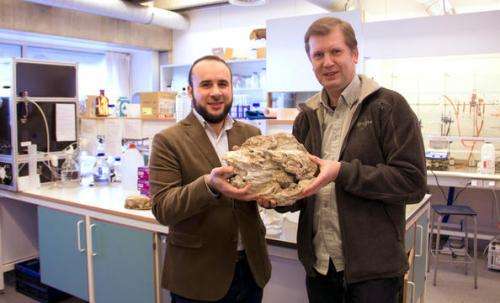Searching for the perfect chemical

Researchers at the University of Stavanger have taken on a nearly impossible task. With support from Total E&P Norge AS, they will attempt to develop new chemicals that combat scaling better than any substance we know today.
Scaling is a problem that can occur in wells and pipelines for oil and gas. It typically happens when pressure and temperature changes, or when seawater is injected into the reservoir – a common method for improving oil recovery from the field.
When seawater mixes with water inside the rock formation, a chemical reaction might occur. If the ions in the two types of water have opposite and relatively high charges they bind together, forming a solid. This happens when the water follows oil, gas and condensate out of the ground, through a riser or transport pipelines.
Constricting pipelines
Barium sulphate is the worst form of scaling. Positively and negatively charged ions bind so strongly to each other that the substance becomes very hard, constricting the pipeline and inhibiting transport. In extreme cases, the problem might contribute to the abandonment of an entire field.
Therefore, oil and gas companies are trying to counteract scaling. Among other things, they have developed chemical substances called "scale inhibitors", which can be continuously injected in the wells, bottomhole or at the tree depending on the location and severity of the scaling risks.
Squeeze
Periodic scale "squeeze" treatments (careful application of pump pressure) may also be required in order to access the reservoir matrix if the scaling occurs in the near wellbore region or at the completion. This project will focus on this squeeze treatment. Used correctly and in large enough quantity, these chemicals prevent deposition before it occurs.
However, operators sometimes have to use large quantities in order to prevent the scaling and those scale squeeze treatments, which imply stopping production, might need repeating quite regularly.
In demanding oilfields such as high temperature fields, the frequency might be even higher as the efficiency is more limited. Research into better chemicals must continue.
Three properties in one
Recently Professor Malcolm Kelland at UiS started up a new project, supported with up to 4.6 million NOK by Total E&P Norge AS, one of the world's largest oil and gas companies.
Together with Postdoc Mohamed Mady, he will try to develop a completely new chemical containing the following three properties:
- Environmentally friendly
- Effective at high temperature
- Easy to track after use, so that the effect of different quantities can be measured
Ticking all the boxes
"The problem is that a substance which performs well in one or two categories is usually poor in the third. In order to succeed we must be able to tick all three boxes", Kelland says.
He does not deny that the project is very difficult and success hinges on many things coming together.
"We will attempt something that no one in the industry has managed previously", says Kelland, who heads the Green Oilfield Chemistry research group at UiS.
Lab experiments
The work will mainly consist of synthesizing new chemicals and testing them in laboratory experiments.
"We are going to look for ideas that exist in the literature, adapt them to the needs of the oil industry and try them out in new contexts. For example, there are many polymers out there, which have been developed for completely different purposes, or maybe no particular purpose at all. We have no guarantees, but it should be exciting", says Kelland.

















